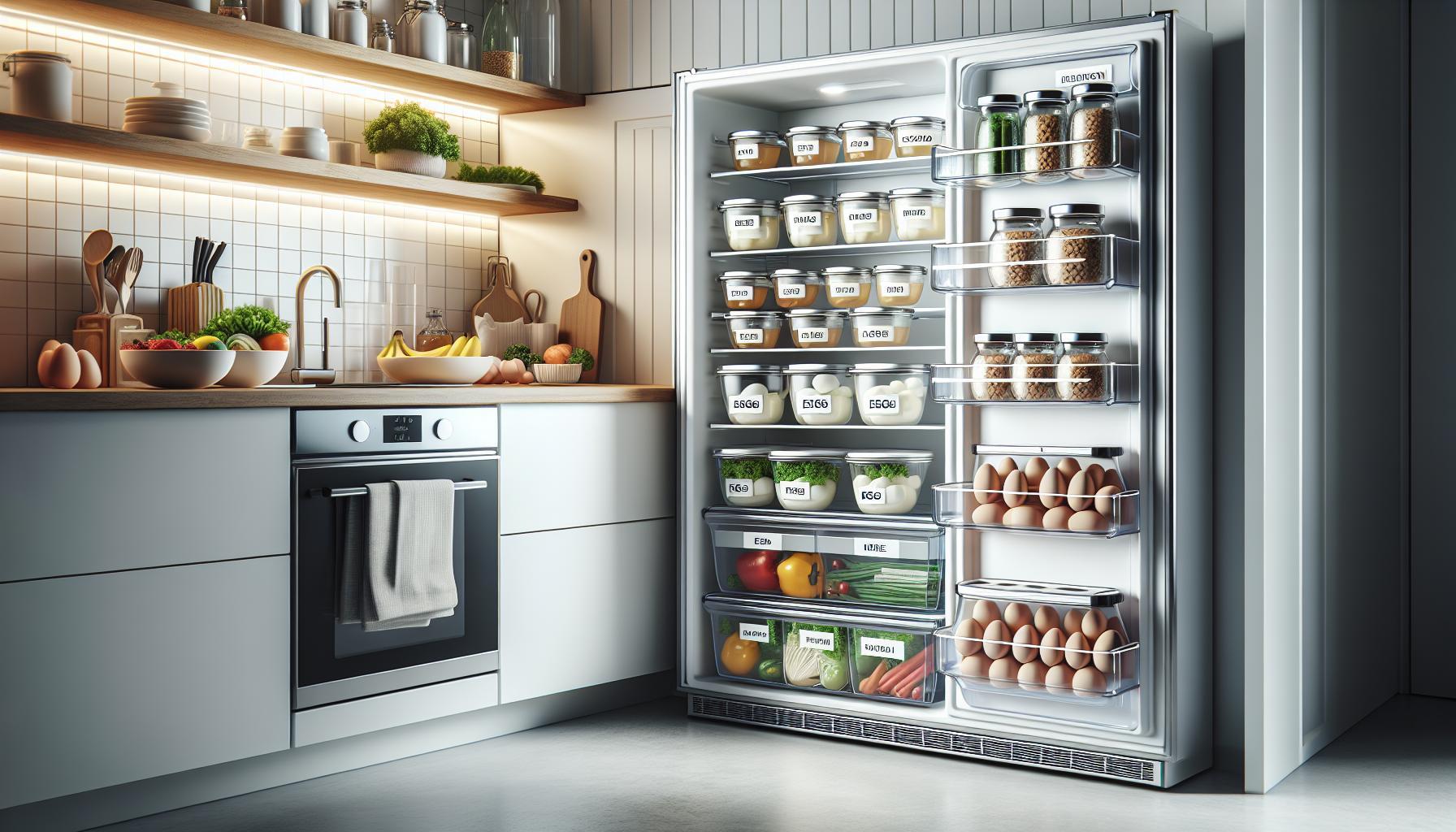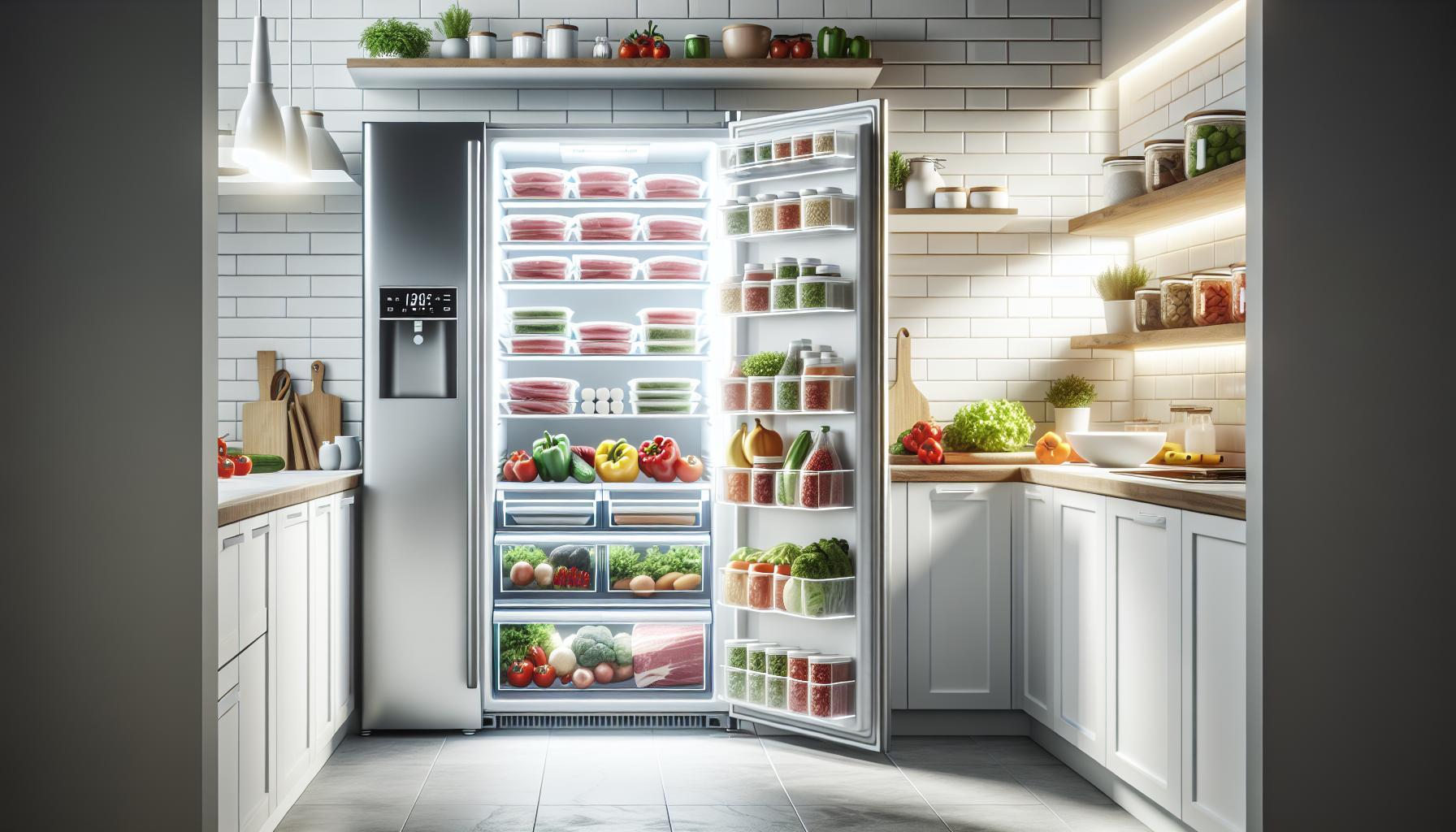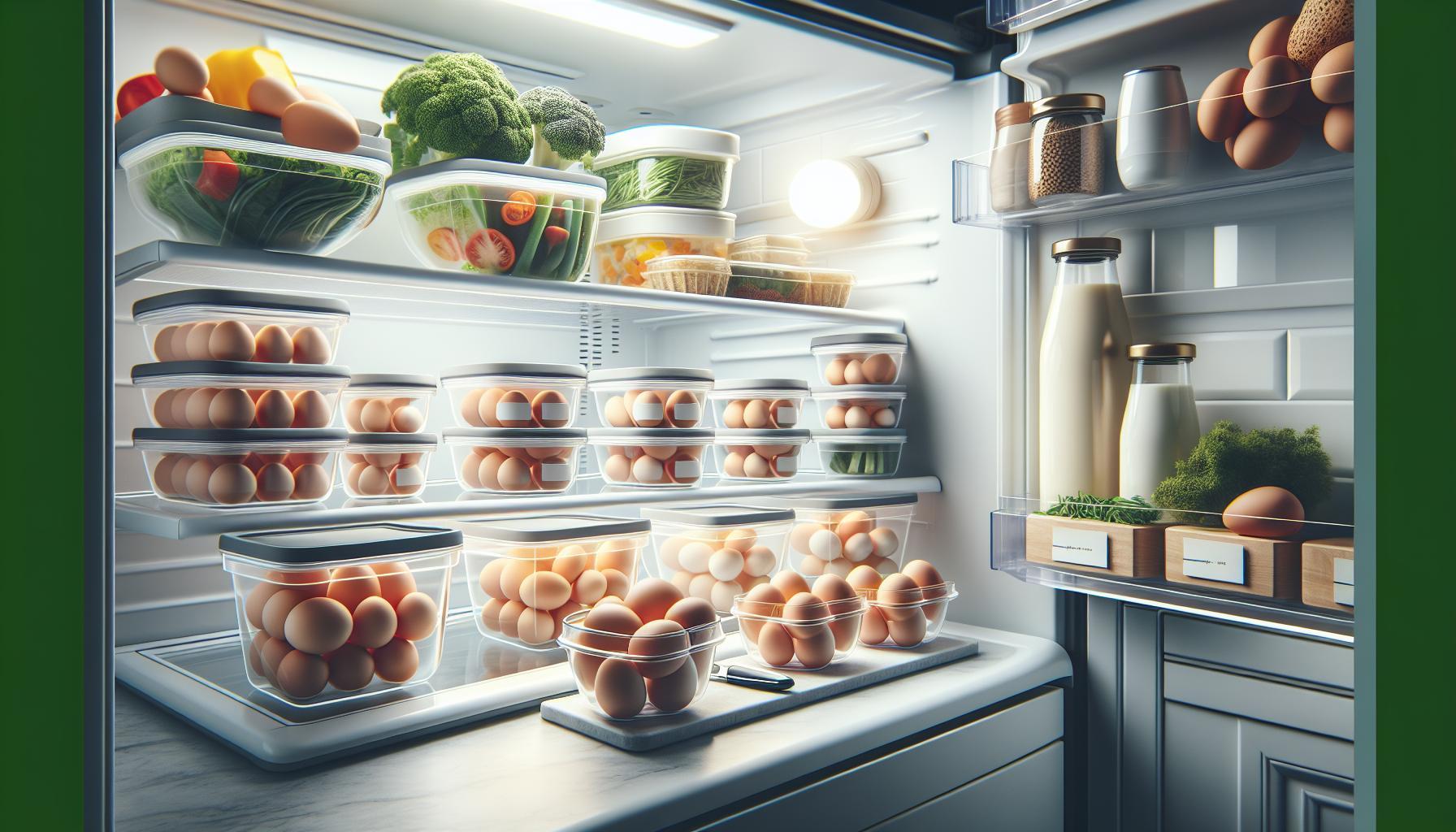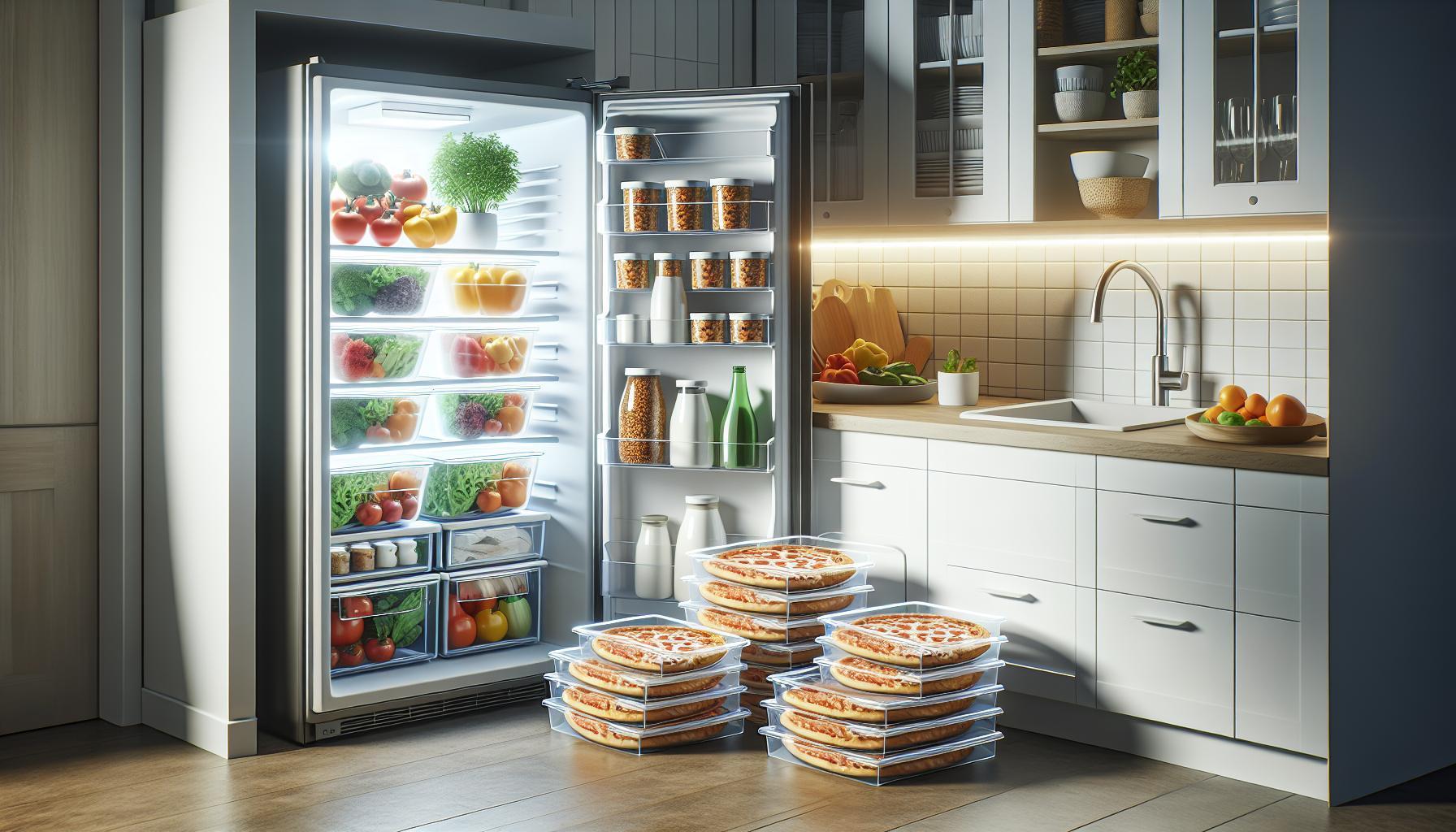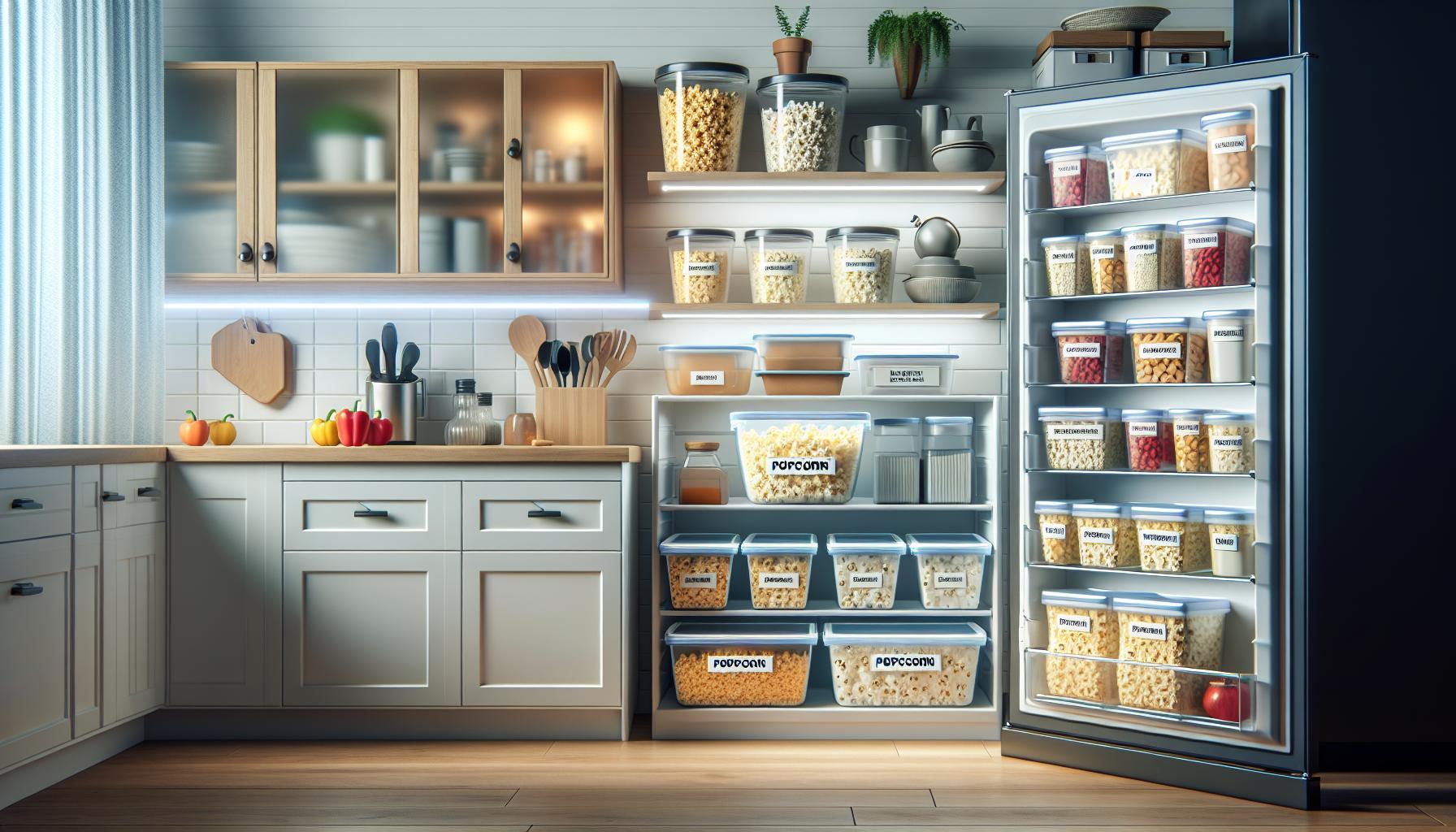Did you know that properly stored boiled eggs can last up to a week in the refrigerator? This makes them an excellent option for healthy snacking, meal prep, or adding protein to a salad. However, understanding how long they truly last and the best storage practices is crucial for maximizing freshness and ensuring food safety.
Many people find themselves wondering how to keep boiled eggs safe to eat, especially when balancing busy lifestyles and meal planning. Your concerns about waste and the risk of spoilage are entirely valid. In this article, we’ll guide you through essential tips on storing boiled eggs, including timelines for freshness and practical safety advice. By the end, you’ll be equipped with the knowledge to enjoy these nutritious snacks worry-free!
How Long Can You Keep Boiled Eggs in the Refrigerator?
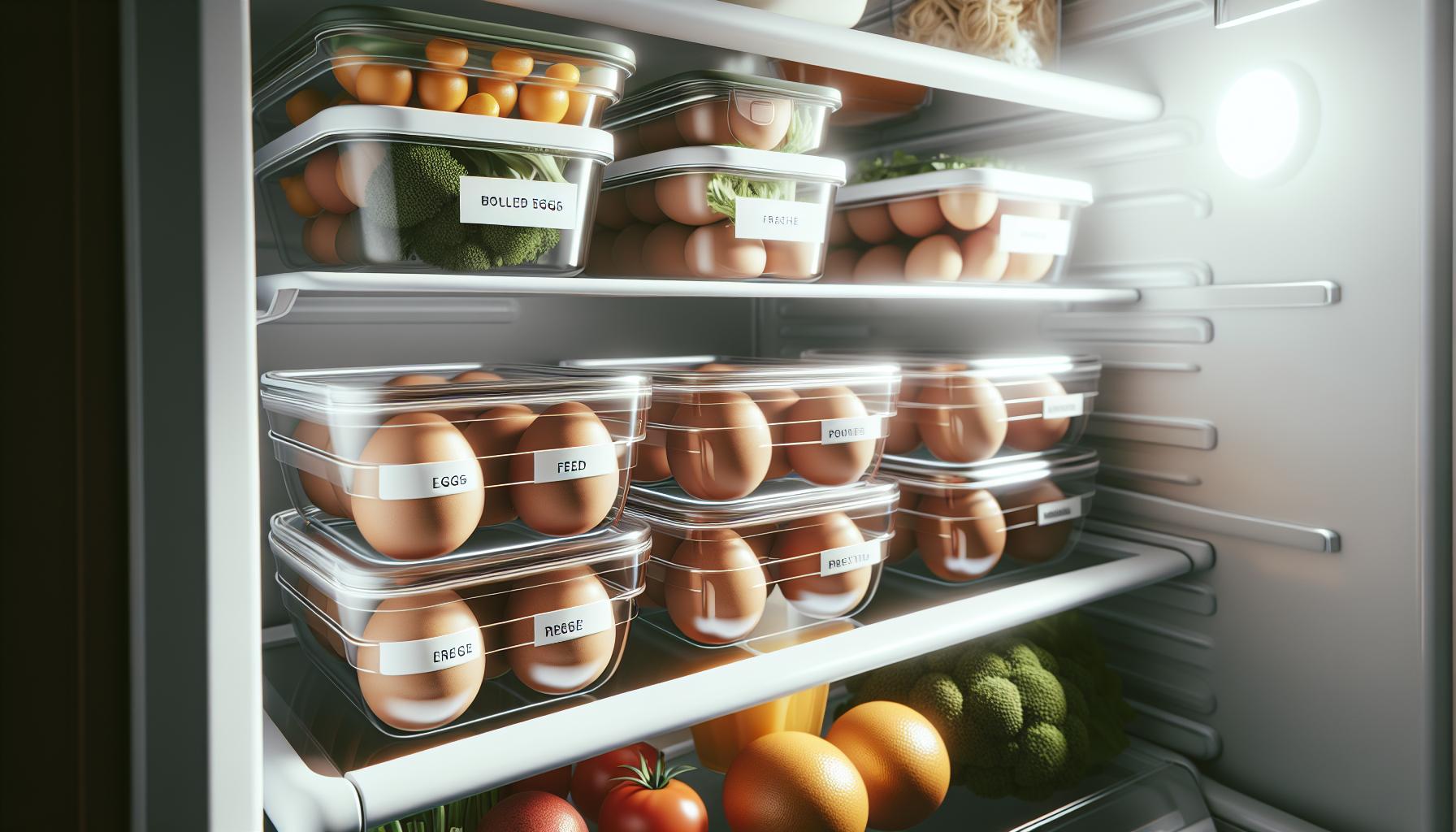
Hard-boiled eggs are a versatile and nutritious snack, but knowing how long you can keep them in the refrigerator is crucial for food safety. When stored properly, hard-boiled eggs can last up to one week in the fridge. The key to maintaining their freshness is to keep them in their shell or in a covered container if peeled. The shell acts as a protective barrier against bacteria and helps retain moisture, making it ideal for storage.
After cooking, it’s essential to cool the eggs before refrigerating them. Placing them in cold water or ice immediately after boiling can help expedite this process, allowing you to transfer them to the refrigerator without delay. Always ensure your refrigerator is set to a safe temperature, ideally below 40°F (4°C), to prevent any bacterial growth. To help you remember, mark the date of boiling on the container; this simple practice can make it easier to keep track of freshness.
As a bonus tip, if you’ve peeled the eggs and notice any off odors or discolorations, it’s best to err on the side of caution. Discard any eggs that seem questionable, as food safety should always be your top priority.
Signs Your Boiled Eggs Have Gone Bad
It’s essential to know the signs that indicate your boiled eggs have gone bad, as consuming spoiled eggs can pose health risks. While hard-boiled eggs can last up to one week in the refrigerator when stored correctly, there are several visual and sensory cues you should watch for that suggest they need to be discarded.
One of the most common indicators is the presence of an off odor. Fresh hard-boiled eggs typically have a mild aroma, but if you detect a sulfur-like smell that intensifies upon peeling, it’s a strong sign that the egg has spoiled. Over time, a change in the egg’s appearance can also occur; fresh boiled eggs should be a uniform creamy color. If you notice any discoloration, such as dark spots or a greenish tint on the egg white, it’s best to err on the side of caution and throw them away.
Another important aspect to consider is the texture of the egg. Upon peeling, if you find that the egg white is slimy or sticky, this could indicate bacterial growth, and those eggs should not be consumed. Additionally, if the boiled eggs are stored without their shells, they may dry out or develop a rubbery texture, further diminishing their quality. Always be vigilant about these signs, and if you have any doubt regarding the freshness of your eggs, it’s better to discard them rather than take the risk.
To enhance food safety, keep an eye on the storage conditions as well. Ensure that your refrigerator maintains a temperature below 40°F (4°C) to help prolong the life of your boiled eggs. Implementing these practices will assist in ensuring that you’re enjoying safe and tasty snacks.
Best Practices for Storing Boiled Eggs
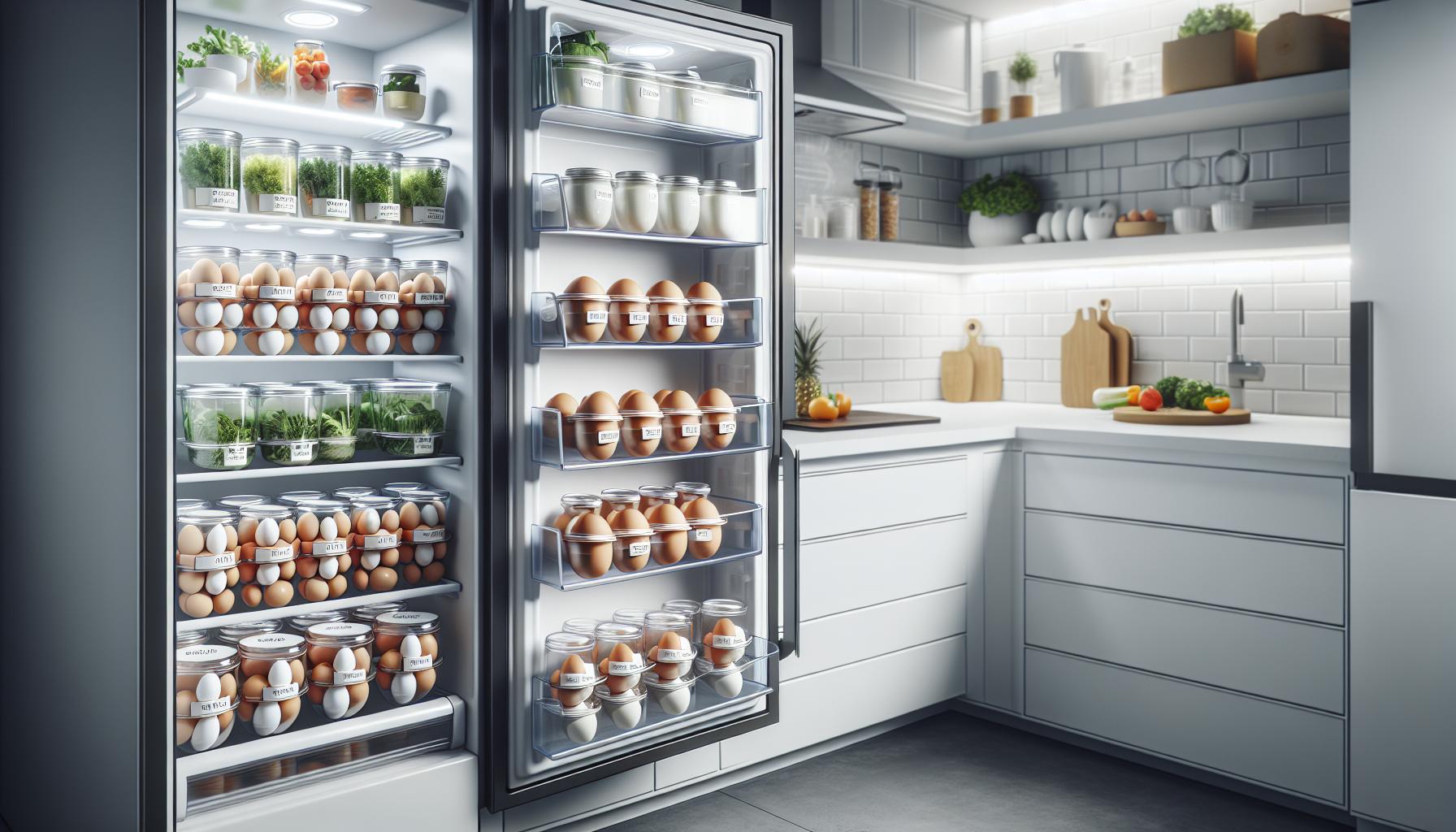
Storing boiled eggs properly is essential for maintaining their freshness and safety for consumption. One of the simplest and most effective practices is to keep them in their shells until you are ready to eat them. The shell acts as a natural barrier against bacteria and helps retain moisture, keeping the egg firm and flavorful. If you choose to peel your eggs, consider placing them in an airtight container, preferably layered with damp paper towels to prevent them from drying out.
When it comes to refrigeration, the eggs should always be stored in the main body of the refrigerator rather than the door. The temperature fluctuates more in the door, which can expedite spoilage. Ideally, the refrigerator temperature should remain below 40°F (4°C) to ensure that the eggs maintain their quality for up to one week. For best results, label your boiled eggs with the date they were cooked, so you can easily manage their freshness.
- Keep them in the shell: If left unpeeled, boiled eggs can last about a week in the refrigerator.
- Use airtight containers: Store peeled eggs in a container with a damp paper towel for extra moisture.
- Refrigerate promptly: After boiling, cool eggs in cold water and refrigerate within two hours.
- Date your eggs: Label stored eggs with the cooking date for easy management of freshness.
By adhering to these best practices, you can extend the lifespan of your boiled eggs, ensuring they remain a safe, nutritious snack option. Whether preparing meal preps or simply enjoying them as is, proper storage techniques are key to delicious and safe consumption.
The Ideal Refrigerator Temperature for Egg Safety
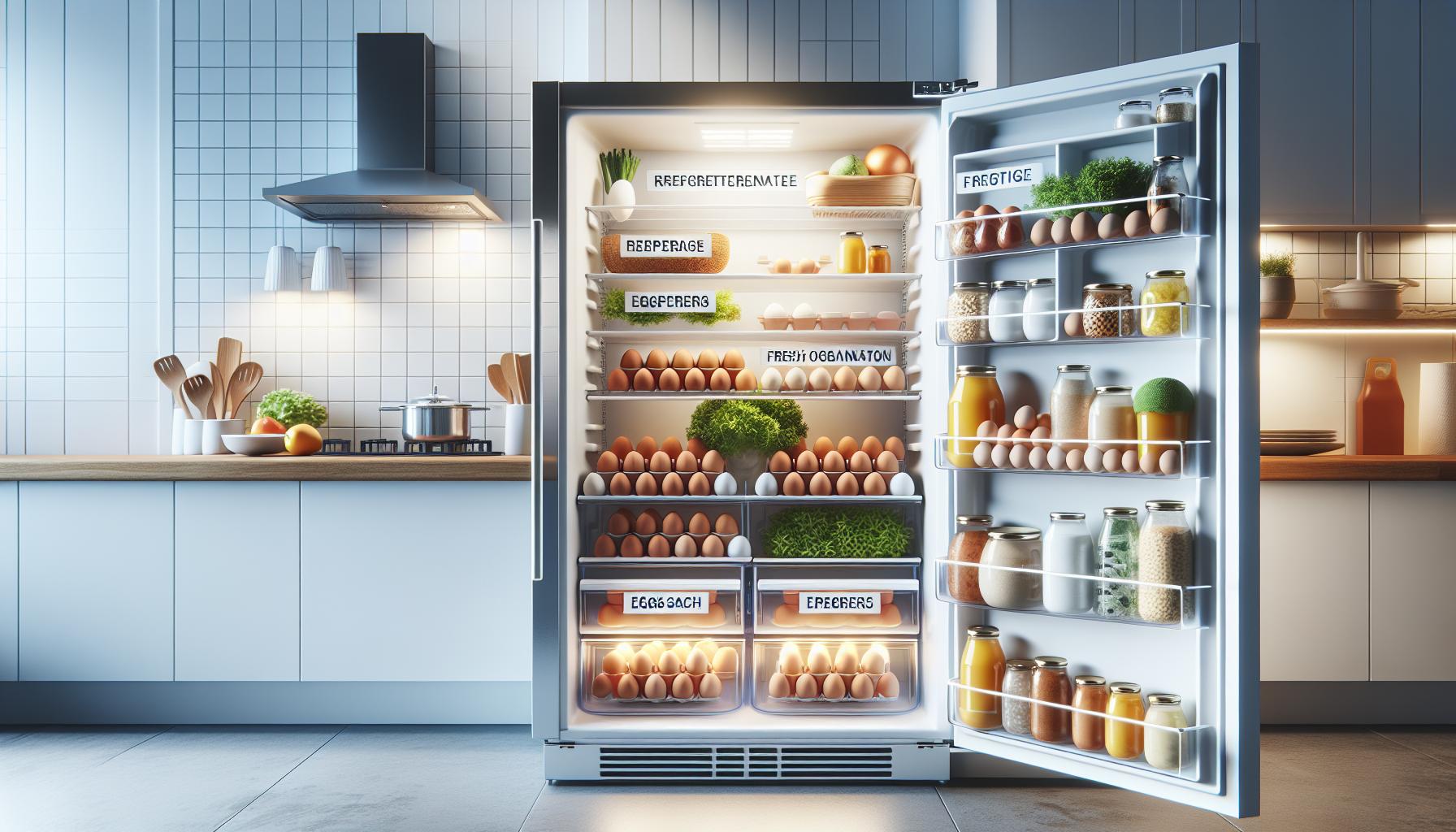
Maintaining the right temperature in your refrigerator is crucial for ensuring the safety and quality of your boiled eggs. The ideal temperature for storing eggs is below 40°F (4°C). Keeping eggs at this temperature slows down the growth of bacteria, reducing the risk of foodborne illness while also preserving flavor and texture. Refrigerators often fluctuate in temperature, especially in the door compartments, making the main body a more reliable option for egg storage.
To effectively manage this, use a refrigerator thermometer to regularly check your appliance’s temperature. If the temperature rises above 40°F, even for a short time, the food stored inside, including your boiled eggs, may become unsafe to eat if it’s been over two hours. Therefore, it’s essential to adjust your refrigerator settings as needed to ensure that it remains consistently cold.
Additionally, it’s good practice to arrange your eggs in the main shelf rather than the door. This minimizes exposure to temperature changes each time the refrigerator is opened. By following these simple steps, you can greatly extend the freshness and safety of your boiled eggs, allowing you to enjoy them as a nutritious snack for up to a week. Regularly labeling your eggs with the cooking date can also ensure you’re aware of their shelf life, aiding in effective meal planning and food safety.
Creative Ways to Use Leftover Boiled Eggs
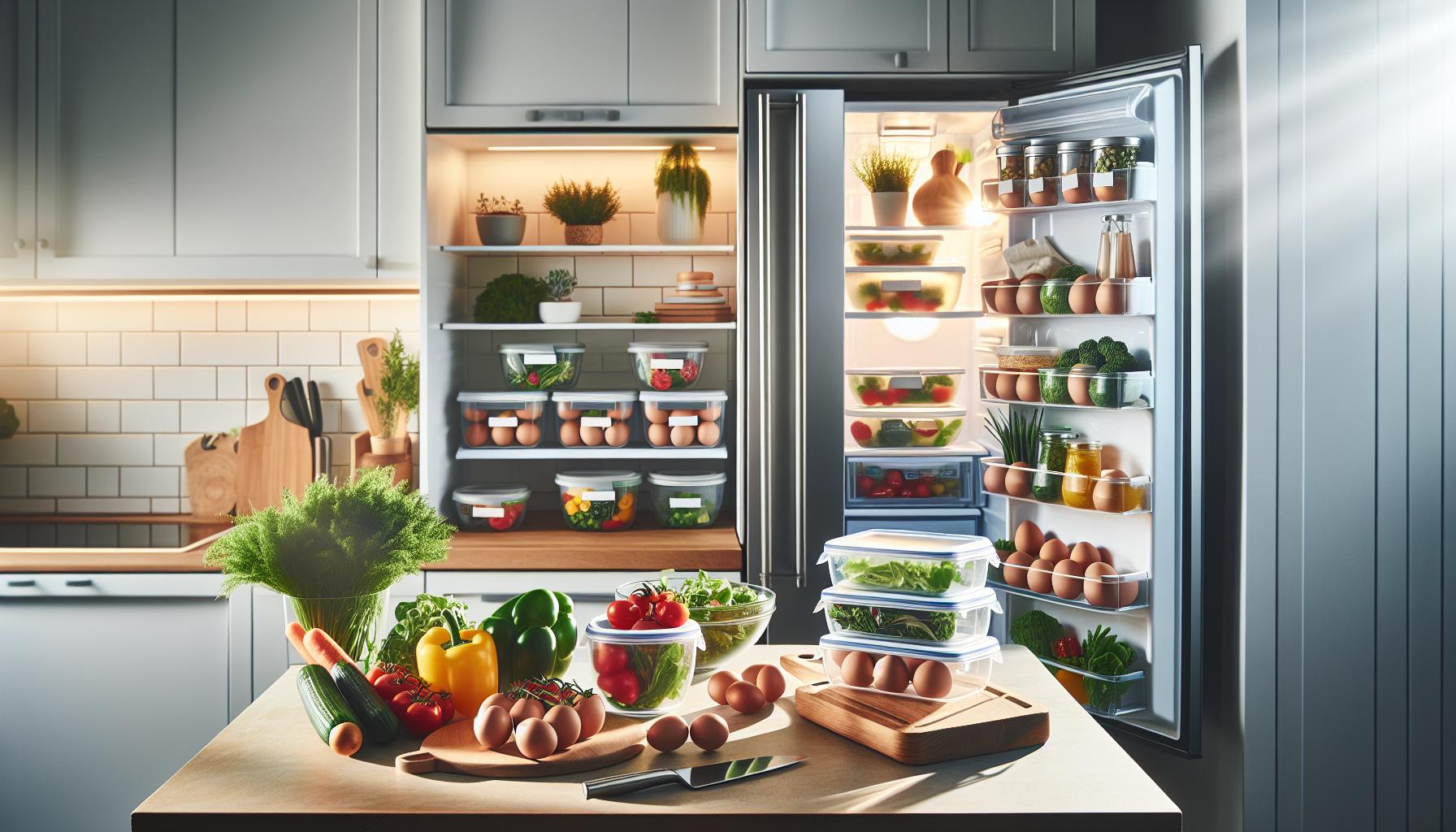
Leftover boiled eggs can be a versatile ingredient, often serving as a time-saving solution for meals and snacks throughout the week. Rather than let those nutritious eggs languish in the refrigerator past their prime, consider some creative ways to incorporate them into your daily dining routine.
One delightful option is to prepare egg salad. Simply chop the boiled eggs and mix them with mayonnaise, mustard, celery, and seasonings of your choice. This classic dish can be served on whole-grain bread for a delicious sandwich or enjoyed with crackers or lettuce leaves for a low-carb alternative. For a twist, spice it up with ingredients like avocado, bacon, or curry powder to create unique flavor profiles.
Another innovative use is to incorporate boiled eggs into grain bowls. Slices of hard-boiled eggs add protein and richness to bowls filled with quinoa, brown rice, or farro, topped with fresh vegetables and a drizzle of dressing. This easy-to-prepare meal allows for endless variations according to your taste, making it a perfect way to utilize leftovers while also enjoying a colorful and nutritious dish.
Don’t overlook the appeal of using boiled eggs in salads. They can elevate a simple green salad, adding texture and taste. Chopped boiled eggs can also be combined with leafy greens, roasted vegetables, and even fruits, like avocado or apples, to create a hearty and fulfilling meal. Furthermore, you can turn boiled eggs into deviled eggs for an elegant appetizer. Just halve the eggs, mix the yolks with mayonnaise, mustard, and spices, then pipe the mixture back into the whites for a crowd-pleasing bite-sized treat.
Incorporating leftover boiled eggs into your meals not only maximizes their use but also ensures that you’re making the most of your food safety practices. Remember that properly stored boiled eggs can last up to a week in the refrigerator, so take advantage of that time by experimenting with these tasty dishes to keep your meals fresh and exciting.
Step-by-Step Guide to Perfect Hard-Boiled Eggs
Perfectly cooked hard-boiled eggs are a nutritious snack and a versatile ingredient for various dishes, but achieving that ideal texture can be tricky. To start, it’s essential to choose the right eggs. Older eggs are preferable for hard boiling since they have a higher pH level, making them easier to peel after cooking. Fresh eggs, on the other hand, are more difficult to peel due to their firm membranes.
Begin by placing your eggs in a single layer in a saucepan or pot, making sure not to overcrowd them. Fill the pot with cold water, ensuring the water covers the eggs by about an inch. Add a pinch of salt or a splash of vinegar to help prevent cracking and make peeling easier later on.
Once you’re ready, cover the pot and turn the heat to high. As soon as the water reaches a rolling boil, remove the pot from heat and let it sit (lid on) for the appropriate amount of time depending on your desired doneness:
- Soft-boiled: 4-6 minutes
- Medium-boiled: 6-9 minutes
- Hard-boiled: 9-12 minutes
After the time is up, immediately transfer the eggs into a bowl of ice water or run them under cold water to halt the cooking process. This not only stops further cooking but also helps to create a steam pocket under the shell for easier peeling. Leave the eggs in the cold water for at least 5-10 minutes before peeling.
To store your perfectly boiled eggs, keep them in their shells for best results, as they can last up to a week in the refrigerator. If you’ve peeled them, store the eggs in a sealed container with a damp paper towel to keep them moist, ideally consuming them within a few days for optimal freshness. By following these steps, you’ll ensure delicious hard-boiled eggs that you can safely enjoy as snacks or incorporate into your meals with confidence.
Reheating Boiled Eggs: What You Need to Know
Reheating boiled eggs might seem like a simple task, but doing it correctly can enhance their taste and texture while ensuring food safety. Many people are unsure about the best methods to reheat boiled eggs, often concerned about overcooking them or ending up with an undesirable texture. When handled properly, reheated boiled eggs can be a delicious and nutritious addition to your meals.
To reheat peeled boiled eggs, the most effective method is to gently warm them in hot water. First, fill a bowl with hot water-just below boiling-and immerse the eggs for about 10 to 15 minutes. This method helps retain moisture and keeps them warm without cooking them further. If you have whole, unpeeled boiled eggs, you can follow the same process, but do ensure that they are not in water that’s too hot, as that could cause the shell to crack.
For those looking for a quicker solution, using a microwave can be an option, although it requires more caution. Place the boiled eggs in a microwave-safe container filled with water, ensuring that they are fully submerged. Cover the container with a microwave-safe lid or plate to trap steam. Heat on low power for 30-second intervals until warmed through, checking frequently to prevent the eggs from bursting due to rapid heating.
Here are a few tips to keep in mind when reheating boiled eggs:
- Temperature Check: Always check that the internal temperature reaches at least 165°F (74°C) to ensure food safety.
- Avoid Overheating: Both methods of reheating can easily lead to overcooking. Aim for gentle heating to maintain texture.
- Serving Suggestion: Reheated boiled eggs can be sliced and added to salads, or enjoyed as a standalone snack with a sprinkle of salt and pepper.
By following these methods, you can enjoy boiled eggs that are both safe and delicious, making them a great addition to your snacking repertoire!
Nutritional Benefits of Boiled Eggs as Snacks
Boiled eggs are not only a convenient snack but also a powerhouse of nutrition, making them an excellent choice for those looking to maintain a healthy diet. Rich in high-quality protein, a single boiled egg contains about 6 grams of protein, which is essential for muscle repair and overall bodily function. What’s more, the protein in eggs can promote satiety, helping to curb hunger and reduce snack cravings throughout the day.
Additionally, boiled eggs are packed with vital nutrients. They offer a good source of vitamins B12, B2 (riboflavin), and B5 (pantothenic acid), which play key roles in energy metabolism. Eggs are also one of the few foods that naturally contain vitamin D, essential for bone health and immune function. Their yolks are rich in choline, an important nutrient for brain health, which supports memory and cognitive function, making them not just a snack but a smart choice for mental alertness.
When considering how long boiled eggs last in the refrigerator, it’s essential to note that they can remain safe for consumption for up to one week when properly stored in a covered container. This makes them a great option for meal prep, allowing you to have nutritious snacks readily available. Enhance your eating experience by pairing boiled eggs with fresh vegetables, or enjoy them sliced on whole-grain toast for a balanced, satisfying bite.
A boiled egg’s nutritional benefits extend beyond just physical health; their versatility as a snack can help keep your diet varied and interesting. Whether eaten plain, boiled to perfection with a bit of seasoning, or integrated into salads and bowls, they are a simple yet effective way to boost your nutrient intake while adhering to food safety practices.
How to Safely Handle and Prepare Eggs
To ensure the safe handling and preparation of eggs, it’s crucial to follow guidelines that minimize the risk of foodborne illness. Eggs can be a vessel for bacteria like Salmonella, which can lead to severe health issues if not properly managed. Begin by purchasing eggs from reputable sources and check for any cracks in the shells before buying. Cracked eggs should never be bought as they pose a higher risk of contamination.
Once you bring eggs home, store them in the refrigerator at a consistent temperature below 40°F (4°C). This is vital to keep bacteria at bay and to maintain their freshness. Consider placing the carton in the main body of the refrigerator rather than the door, where temperatures can fluctuate more frequently due to opening and closing. It’s a common myth that eggs should be stored at room temperature; however, maintaining cool conditions is essential for safety.
When handling eggs, always wash your hands with soap and water before and after touching them. This practice helps prevent the transfer of bacteria from the eggshell to other surfaces or foods. Use clean and sanitized utensils, cutting boards, and countertops to further reduce the risk of cross-contamination. If you’re preparing boiled eggs, ensure they are thoroughly cooked-boil them for at least 9-12 minutes depending on the size for effective cooking.
Lastly, remember to refrigerate any unused boiled eggs within two hours of cooking. Store them in a tightly sealed container to retain freshness. By adhering to these practices, you can confidently enjoy boiled eggs, knowing you’re prioritizing your health and safety.
Common Myths About Egg Storage Debunked
One prevalent misconception about egg storage is that eggs should be kept on the countertop rather than in the refrigerator. This myth originates from practices in some countries where refrigeration is not the norm. However, storing eggs, especially boiled ones, at room temperature can significantly increase the risk of bacterial growth, as temperatures between 40°F (4°C) and 140°F (60°C) are considered the ‘danger zone’ for food. To ensure safety and extend freshness, boiled eggs should always be refrigerated within two hours of cooking, ideally kept in a sealed container to minimize exposure to air and potential contaminants.
Another common misunderstanding is the idea that hard-boiled eggs can last indefinitely in the fridge. While properly stored boiled eggs can remain fresh for about one week in the refrigerator, they are not immune to spoilage. Over time, their quality deteriorates, which can lead to an unpleasant smell and taste. Regularly check the eggs for any signs of off-odors or changes in texture, as these can be indicators that they have gone bad.
Some people believe that peeling boiled eggs before storage is a good practice to save time for later use. While this may seem convenient, it actually exposes the egg to air, which can lead to faster drying out and a higher chance of absorbing odors from the fridge. The best practice is to leave the shell on until you’re ready to eat them. When it’s time for consumption, peeling the eggs just before use helps retain their moisture and flavor.
Lastly, many assume that if there’s no visible mold or spoilage, the egg is certainly safe to eat. This is a dangerous presumption; some bacteria, like Salmonella, do not always produce noticeable signs before the food becomes unsafe. It’s imperative to familiarize oneself with the proper methods of egg storage and handling to mitigate any food safety risks. Keeping a watchful eye on storage times and maintaining a clean environment are essential steps in ensuring that your eggs are both safe and enjoyable to eat.
Food Safety Tips for Egg-Based Dishes
To ensure the safety of egg-based dishes, it’s crucial to adhere to proper food handling and storage practices. The Centers for Disease Control and Prevention (CDC) has highlighted that eggs can harbor harmful bacteria, such as Salmonella, which can lead to foodborne illness. To mitigate these risks, always start with clean hands and sanitized cooking surfaces. When working with raw eggs, use separate utensils and containers to avoid cross-contamination with other foods.
- Cook Eggs Thoroughly: Ensure eggs are cooked until both the white and yolk are firm. For instance, scrambled eggs should not be runny, and hard-boiled eggs should be firm throughout.
- Watch the Temperature: Keep cooked egg dishes at a safe temperature. Hot foods should be maintained at 140°F (60°C) or above, while cold dishes should be stored in the refrigerator below 40°F (4°C).
- Storage Guidelines: If you have leftovers containing eggs, they should be refrigerated within two hours of cooking. Consume refrigerated egg dishes within three to four days for optimal safety.
- Safe Reheating: When reheating egg dishes, ensure they reach an internal temperature of 165°F (74°C) to kill any potential bacteria.
Being mindful of these key safety practices not only helps prevent foodborne illness but also enhances the overall dining experience. Implementing these safety measures makes enjoying egg-based dishes a worry-free endeavor. Remember, understanding food safety is essential for preventing illness and savoring delicious meals confidently.
Faq
Q: How can I tell if my hard-boiled eggs are still fresh?
A: Fresh hard-boiled eggs should have a firm white and a bright yellow yolk. If the eggs have an off smell, dry surfaces, or a dark color, they have likely gone bad. Always trust your senses and check for any changes before consuming them.
Q: Can you freeze hard-boiled eggs?
A: It is not recommended to freeze hard-boiled eggs in their entirety as they can become rubbery. However, you can freeze the yolks for later use by separating them and placing them in a sealed container. Be sure to use within six months for best quality.
Q: What is the best way to store peeled hard-boiled eggs?
A: Store peeled hard-boiled eggs in a covered container with a damp paper towel to maintain moisture. Alternatively, submerge them in water in a sealed jar to keep them fresh. They should be consumed within 3-5 days for optimal safety.
Q: How long can I keep hard-boiled eggs at room temperature?
A: Hard-boiled eggs should not be left at room temperature for more than two hours. After that, they can become a breeding ground for bacteria. Always refrigerate them if they are not consumed immediately.
Q: Are hard-boiled eggs safe to eat after one week?
A: Yes, hard-boiled eggs are generally safe to eat if stored correctly in the refrigerator for up to one week. Ensure they are kept in a covered container to maintain freshness and prevent absorption of odors from other foods.
Q: Should hard-boiled eggs be stored in their shells?
A: It is best to store hard-boiled eggs in their shells as it provides natural protection against bacteria and helps keep moisture in. If peeled, store them in a damp environment to maintain their quality. Check out our section on best practices for more details.
Q: What is the ideal temperature to store boiled eggs?
A: The ideal refrigerator temperature for storing hard-boiled eggs is at or below 40°F (4°C). This temperature range helps to inhibit bacterial growth, ensuring your eggs stay safe to eat. Regularly check your fridge’s temperature for optimal food storage.
Q: How can I safely reheat hard-boiled eggs?
A: To safely reheat hard-boiled eggs, submerge them in hot water for about 10-15 minutes. Avoid using a microwave directly, as it can cause the egg to explode. For more reheating tips, refer to our dedicated section on reheating boiled eggs.
Key Takeaways
To ensure your boiled eggs remain safe and delicious, remember to store them properly in the refrigerator for up to one week. By following our guidelines, you can enjoy hassle-free snacking and minimize food waste. For more tips on safe food storage, don’t miss our articles on “How to Safely Store Leftovers” and “Best Practices for Egg Handling.”
If you found this information helpful, consider subscribing to our newsletter for more expert insights and delicious recipes. Your kitchen confidence matters, and by sharing your thoughts in the comments below, you not only help us improve but also engage with a community passionate about food safety. Keep exploring, and let’s continue making informed choices together!

